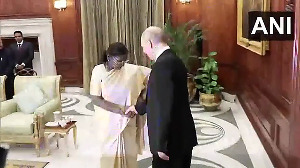If back-channel intelligence co-operation has played a role in the arrest, the government of India will not be forthcoming in order not to embarrass the other two governments. However, if back channel co-operation had played no role and if the complicity of the Pakistani agencies with the LeT had played a role in this matter, the implications could be more serious, says B Raman.
Union Home Minister P Chidambaram has been quoted as saying on June 25 as follows: "Abu Jindal has been apprehended and remanded to custody of law enforcement agencies."
Some media reports disseminated earlier had said: "On June 21, the Intelligence Branch took custody of Abu Hamza allies Sayed Zabiuddin, on his deportation from Saudi Arabia at the Indira Gandhi International Airport in New Delhi and later on June 25, formally handed him over to Delhi Police, that announced the arrest, for him to be produced at the New Delhi Court for trial."
Some other media reports had said: "The name of Sayed Zabiuddin Ansari alias Abu Hamza alias Abu Jindal first surfaced in connection with an arms haul in Aurangabad in 2006. He is also believed to have had a hand in the 2006 Mumbai train blasts, was allegedly one of six Lashkar-e-Tayiba handlers of the terrorists who attacked Mumbai on November 26, 2008 and has played a role in many other terror attacks all over the country, including an alleged plot to assassinate Gujarat Chief Minister Narendra Modi."
The Lashkar-e-Tayiba has been emulating the example of the Palestinian terrorist organisations in allotting kuniyats (assumed names) to its field operatives in order to conceal their real identity. These kuniyats are chosen from the names of the Companions of the Holy Prophet.
The Palestinian terrorist organisations generally follow the principle of allotting one kuniyat to one operative. Till that operative dies, the same kuniyat is not allotted to any other operative. The Lashkar does not follow any such practice. Sometimes, the same kuniyat is allotted to more than one operative and sometimes the same operative is allotted more than one kuniyat. This makes identification difficult.
Since the LeT started operating in Indian territory in 1993, it has been frequently using the kuniyat Abu Hamza. In the late 1990s, the man in charge of publicity and propaganda in the LeT headquarters in Muridke in Pakistani Punjab used to be called Abu Hamza.
In 2002, the Tamil Nadu police had arrested some Tamil Muslims who had formed an organisation called Muslim Defence Force. They reportedly stated during their interrogation that they were motivated to form the MDF by one Abu Hamza, alias Abdul Bari, an Indian Muslim living in Saudi Arabia and associated with the LeT, and one Abu Omar, a Pakistani Muslim working there, after the Gujarat riots.
The kuniyats Abu Hamza and Abu Jindal had figured in the investigation reports regarding the involvement of Sayed Zabiuddin Ansari, reportedly of Georai area of Beed district in Maharashtra, in the terrorist attack on some suburban trains of Mumbai in July, 2006, and in the 26/11 terrorist strikes in Mumbai.
Ajmal Kasab, the lone survivor of the 10-member Pakistani terrorist team of the LeT which attacked Mumbai on 26/11, had reportedly stated during his interrogation by the Mumbai police that one of the Karachi-based conspirators who had trained the 10 members of the LeT team, and taught them Hindi was known as Abu Jindal. From the description of his, he appeared to be an Indian Muslim.
On February 12, 2009, Rehman Malik, Pakistan's interior minister, had claimed that the Pakistani police had made a breakthrough in the investigation of the 26/11 terrorist strikes and arrested seven persons for involvement in the conspiracy. One of the persons named by him was Abu Hamza. However, he did not give his real name.
According to claims made by Pakistani authorities, after the completion of the investigation, these persons, including Abu Hamza, have been charge-sheeted before an Anti-Terrorism Court, but the trial has not made any progress due to frequent transfers of the judges and the judges frequently going on leave.
The interrogation of the arrested person by the Delhi and Mumbai police should help to establish whether the person named as Abu Jindal by Kasab and whether the person named as Abu Hamza by the Pakistani interior minister are one and the same and whether Abu Jindal and Abu Hamza are the kuniyats of Syed Zabiuddin Ansari, an Indian Muslim, as believed by our police.
If all the three are established to be one and the same, the question will arise as to how Abu Hamza arrested by the Pakistani authorities on February 12, 2009, managed to go to Saudi Arabia? Did he escape due to negligence or complicity or was he quietly released by the Pakistani authorities or is his landing in the hands of the Delhi police the result of back channel co-operation between the intelligence agencies of India, Pakistan and Saudi Arabia consequent upon the recent visit of the director of our Intelligence Bureau to Islamabad as a member of the Indian officials' team headed by our home secretary for talks with their Pakistani counterparts.
It would be difficult to find answers to these questions unless the government of India is forthcoming. If back-channel intelligence co-operation has played a role, the government of India will not be forthcoming in order not to embarrass the other two governments.
However, if back channel co-operation had played no role and if the complicity of the Pakistani agencies with the LeT had played a role in this matter, the implications could be more serious, indicating that the Pakistani agencies want to resume mass casualty terrorist strikes in Indian territory using the LeT once again. This would call for the utmost alertness by our agencies.





